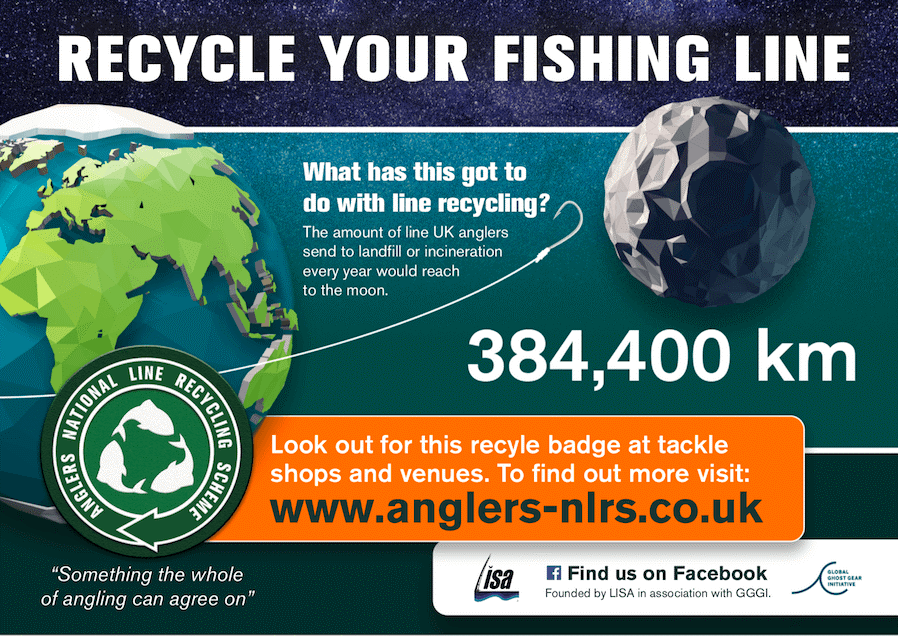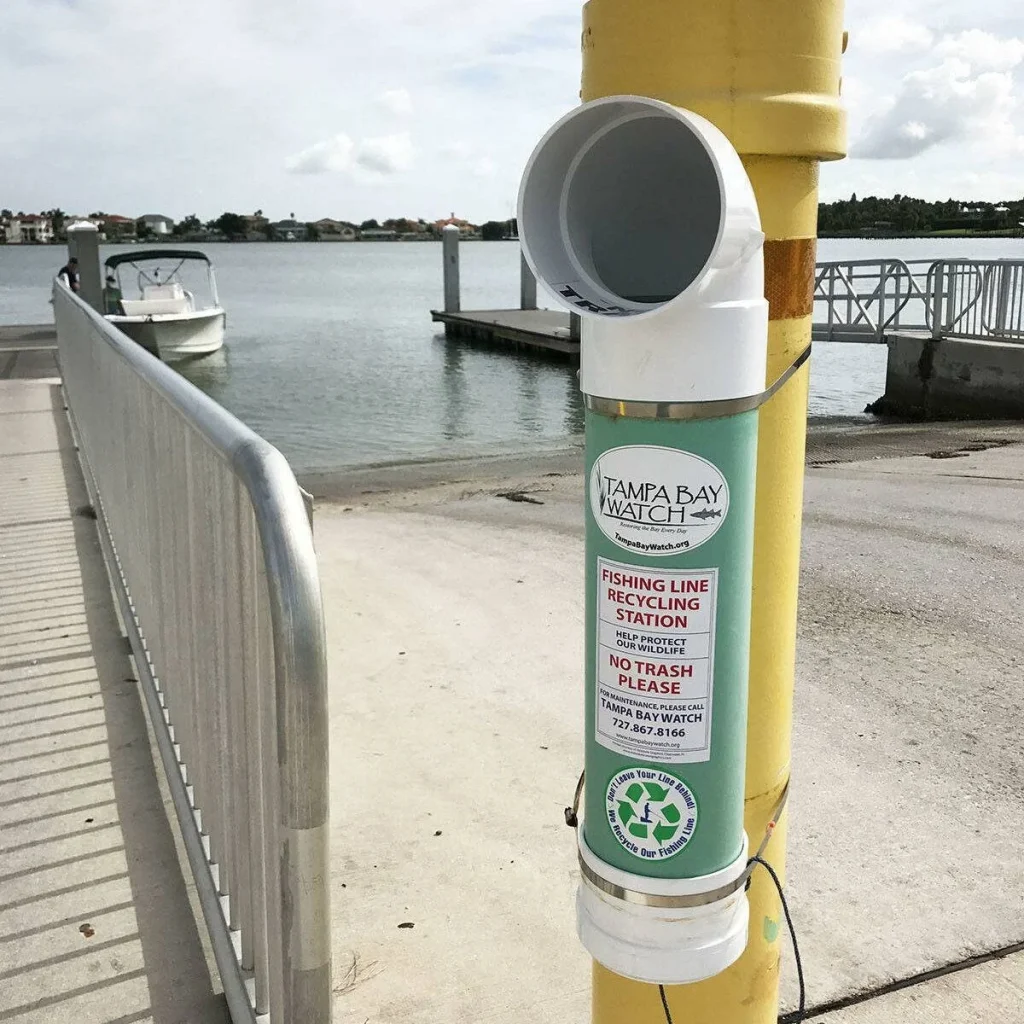Have you ever wondered what to do with your old fishing line? If you’re like many anglers, you might just toss it in the trash or leave it behind without a second thought.
But did you know that improper disposal can harm wildlife and pollute our waterways? You care about the environment and want to keep your favorite fishing spots clean. That’s why knowing how to dispose of fishing line the right way is so important.
Keep reading, and you’ll discover simple, effective steps to protect nature while enjoying your time on the water. Your actions can make a real difference.

Credit: blog.scoutingmagazine.org
Environmental Impact Of Fishing Line
Fishing line is strong and thin, but it can harm the environment if not disposed of properly.
Leftover fishing line can stay in nature for years. It can cause serious damage to animals and water systems.
Effects On Wildlife
Wild animals can get tangled in fishing line. This can stop them from moving, eating, or breathing.
- Birds may get caught and lose feathers or die.
- Fish and turtles can get trapped and injured.
- Animals may eat small pieces, causing internal harm.
- Entanglement can lead to infections or slow death.
Pollution In Waterways
Fishing line adds to plastic pollution in rivers, lakes, and oceans. It does not break down quickly.
| Impact | Description |
| Water Clarity | Fishing line floats and sinks, harming water quality. |
| Habitat Damage | Lines can cover plants and coral, blocking sunlight. |
| Microplastic Creation | Over time, line breaks into tiny pieces that pollute water. |
| Animal Health | Pollution affects the food chain and animal survival. |

Credit: www.tampabaywatch.org
Types Of Fishing Line
Fishing line is essential for every angler. Different types suit different fishing needs. It’s important to know how to dispose of each type properly.
Here, we will explore the three main types: Monofilament, Braided, and Fluorocarbon. Each has unique features and disposal methods.
Monofilament
Monofilament line is popular and affordable. It is made from a single strand of plastic. It is flexible and easy to handle.
To dispose of monofilament, cut it into small pieces. This prevents wildlife from getting tangled. Use recycling bins at fishing stores if available.
Braided
Braided line is made from woven fibers. It is strong and lasts longer. Anglers use it for heavy fish and tough conditions.
Dispose of braided line by cutting it into short lengths. This reduces the risk to animals. Check if your local area has a recycling program.
Fluorocarbon
Fluorocarbon line is nearly invisible underwater. It is more resistant to abrasion. Anglers use it for clear water and shy fish.
To dispose of fluorocarbon, chop it into small pieces. This stops wildlife from becoming entangled. Look for special recycling options if available.
Safe Disposal Methods
Fishing line can harm wildlife and the environment if not thrown away properly. It is important to dispose of it safely to keep nature clean and safe.
There are safe ways to get rid of fishing line. These methods help recycle or dispose of it without causing damage.
Recycling Programs
Many places offer fishing line recycling programs. These programs turn old fishing line into new products instead of throwing it away.
You can collect your used fishing line and drop it off at these programs. This helps reduce waste and protects animals.
- Fishing line is cleaned and processed for reuse
- Recycled line can become new fishing gear or plastic products
- Programs often work with local fishing shops and parks
Designated Drop-off Points
Designated drop-off points accept used fishing line safely. These spots keep the line from ending up in landfills or nature.
Check local fishing stores, marinas, or park centers for drop-off bins. Use these bins to dispose of your fishing line properly.
- Drop-off points keep fishing line contained and safe
- They prevent line from tangling in wildlife
- Many locations provide free disposal services

Credit: www.anglingdirect.co.uk
Diy Recycling Ideas
Fishing line can harm wildlife and the environment if not disposed of properly. Recycling fishing line at home helps protect nature and gives new life to old materials.
Here are simple ways to reuse fishing line in craft projects and gardening. These ideas reduce waste and add value to your daily activities.
Craft Projects
Old fishing line is strong and flexible. You can use it for many craft projects around the house. It works well for making jewelry, decorations, and more.
- Make bracelets or necklaces by stringing beads onto the line.
- Create hanging mobiles or wind chimes by tying small objects to the line.
- Use fishing line to hang picture frames or lightweight art pieces.
- Weave it into homemade dreamcatchers for a sturdy frame.
- Repair torn nets or fabric by stitching with the fishing line.
Reuse In Gardening
Fishing line is durable and weather-resistant. It is useful in the garden to support plants and keep pests away.
| Use | Description |
| Plant Support | Tie plants to stakes or trellises for better growth. |
| Bird Deterrent | Stretch line around plants to keep birds from eating fruits. |
| Garden Markers | Attach labels to plants with fishing line for easy identification. |
| Hanging Planters | Use line to hang pots or baskets from hooks or branches. |
| Repair Garden Tools | Fix broken handles or parts by wrapping with fishing line. |
Tips For Reducing Waste
Fishing line can harm the environment if thrown away carelessly. Reducing waste helps protect water and wildlife.
Using better fishing line and caring for your gear lowers the amount of waste you create.
Using Biodegradable Lines
Biodegradable fishing lines break down naturally over time. They reduce pollution in oceans and lakes.
These lines are made from materials that nature can absorb without harm. They are safer for fish and birds.
- Choose lines labeled biodegradable
- Check if the line works well for your fishing type
- Dispose of old lines in proper bins
Proper Line Maintenance
Taking care of your fishing line helps it last longer. This reduces how often you need new line.
Regular checks and cleaning stop damage and tangles. This keeps your gear ready and lowers waste.
- Rinse line with fresh water after use
- Store line away from sunlight and heat
- Replace damaged sections instead of whole spool
Community Cleanup Initiatives
Fishing line can harm wildlife and pollute water. Communities can help by organizing cleanup efforts.
Working together makes it easier to collect and dispose of fishing line properly.
Organizing Local Events
Local events bring people together to clean parks, rivers, and lakes. These events raise awareness about fishing line dangers.
Plan the event with clear goals. Provide bags and containers for fishing line collection. Make sure to follow safety rules.
- Choose a public area near water
- Set a date and time
- Invite local residents and fishing groups
- Offer instructions on how to handle fishing line safely
- Arrange for proper disposal after the event
Partnering With Environmental Groups
Environmental groups have experience and tools for cleanup work. They can help with supplies and volunteers.
Working with these groups can increase the impact of your cleanup efforts. They also provide education on fishing line recycling.
- Contact local or national environmental organizations
- Collaborate on event planning and promotion
- Use their expertise for safe fishing line disposal
- Share resources like recycling bins and signs
- Encourage ongoing partnerships for regular cleanups
Frequently Asked Questions
How Do I Safely Dispose Of Fishing Line?
To safely dispose of fishing line, cut it into small pieces and place it in a designated recycling bin. Use local fishing line recycling programs or collection containers when available. Avoid throwing line in regular trash to prevent harm to wildlife and the environment.
Can Fishing Line Be Recycled?
Yes, fishing line can be recycled. Many communities have special recycling programs for monofilament fishing line. Recycled line is often repurposed into products like plastic lumber and fishing gear. Check local facilities for proper recycling options.
Why Should Fishing Line Not Be Littered?
Fishing line litter harms wildlife by entangling animals and causing injury. It also pollutes waterways and natural habitats. Proper disposal helps protect ecosystems, supports fishing sustainability, and keeps outdoor spaces clean.
What Are Alternatives To Disposing Fishing Line In Trash?
Instead of trash, use recycling bins or fishing line collection points. Some tackle shops offer recycling programs. You can also repurpose old line for crafts or safe disposal at hazardous waste centers.
Conclusion
Proper disposal of fishing line protects wildlife and the environment. Always cut the line into small pieces before discarding. Use designated recycling bins when available. Avoid throwing fishing line in regular trash or water. Small actions by anglers help keep nature clean and safe.
Remember, every responsible step matters for our planet’s health. Keep fishing fun and eco-friendly by disposing of lines correctly. Together, we can reduce pollution and protect aquatic life. Simple habits make a big difference. Stay mindful and care for the waters you enjoy.
